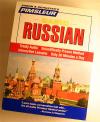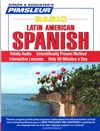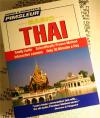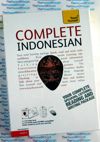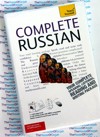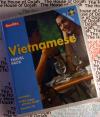Teach Yourself Complete Ukrainian - 2 Audio CDs and Book - Learn to speak Ukrainin
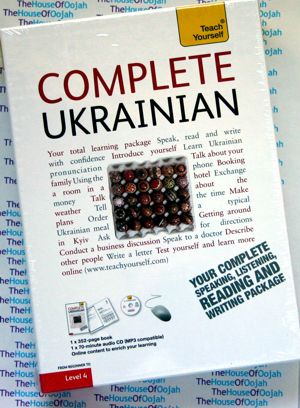
Teach Yourself Complete Ukrainian2 CDs and Book Audio CDGet Other Teach Yourself Language Learning Audio click here |
 |
Teach Yourself Complete Ukrainian - 2 Audio CDs and Book2 CDs and Book Are you looking for a complete course in Ukrainian which takes you effortlessly from beginner to confident speaker? Whether you are starting from scratch, or are just out of practice, Complete Ukrainian will guarantee success! Now fully updated to make your language learning experience fun and interactive. You can still rely on the benefits of a top language teacher and our years of teaching experience, but now with added learning features within the course and online. The course is structured in thematic units and the emphasis is placed on communication, so that you effortlessly progress from introducing yourself and dealing with everyday situations, to using the phone and talking about work. By the end of this course, you will be at Level B2 of the Common European Framework for Languages: Can interact with a degree of fluency and spontaneity that makes regular interaction with native speakers quite possible without strain for either party. Learn effortlessly with a new easy-to-read page design and interactive features: NOT GOT MUCH TIME? AUTHOR INSIGHTS GRAMMAR TIPS USEFUL VOCABULARY DIALOGUES PRONUNCIATION TEST YOURSELF EXTEND YOUR KNOWLEDGE TRY THIS Table of Contents: About the Authors
About the Ukrainian LanguageUkrainian is a language of the East Slavic subgroup of the Slavic languages. It is the official state language of Ukraine. Written Ukrainian uses the Cyrillic alphabet. The Ukrainian language traces its origins to the Old Slavic language of the early medieval state of Kievan Rus'. In its earlier stages it was known as Ruthenian. Ukrainian is a lineal descendant of the colloquial language used in Kievan Rus (10th–13th century). The language has persisted despite several periods of bans, discouragement or both throughout centuries as it has always maintained a sufficient base among the people of Ukraine, its folklore songs, itinerant musicians, and prominent authors. It is accepted that before the eighteenth century the precursor to the modern literary Ukrainian language was a vernacular language used mostly by peasants and petits bourgeois as no traces of earlier literary works could be found. It existed along with Church Slavonic, a literary language of religion that evolved from the Old Slavonic. The earliest literary work in the modern Ukrianian language was recorded in 1798 when Ivan Kotlyarevsky published his epic poem, Eneyida, a burlesque in Ukrainian, based on Virgil's Aeneid. His book was published in vernacular Ukrainian in a satirical way to avoid being censored, and is the earliest known Ukrainian published book to survive through Imperial and, later, Soviet policies on the Ukrainian language.The Ukrainian language is currently emerging from a long period of decline. Although there are almost fifty million ethnic Ukrainians worldwide, including 37.5 million in Ukraine (77.8% of the total population), only in western Ukraine is the Ukrainian language prevalent. In Kiev, both Ukrainian and Russian are spoken, a notable shift from the recent past when the city was primarily Russian speaking. The shift is caused, largely, by an influx of the rural population and migrants from the western regions of Ukraine but also by some Kievans' turning to use the language they speak at home more widely in everyday matters. In northern, southern, eastern and central Ukraine, Russian is the language of the urban population. Use of the Ukrainian language in Ukraine can be expected to increase, as the rural population (still overwhelmingly Ukrainophone) migrates into the cities and the Ukrainian language enters into wider use in central Ukraine. However, the situation in eastern and southern Ukraine is not changing a lot, the rural Ukrainophones continue switching to Russian. The literary tradition of Ukrainian is also developing rapidly overcoming the consequences of the long period when its development was hindered by either direct suppression or simply the lack of the state encouragement policies.The word mova is used for "language" instead of jazyk as in most other Slavic languages, due to semantic differences; mova means "speech" whereas jazyk means "tongue" (note that both these words can mean "language" in English). |
Teach Yourself Complete Ukrainian - 2 Audio CDs and Book |
| Stock Info: | Out of Print |

 0 Items (Empty)
0 Items (Empty)
